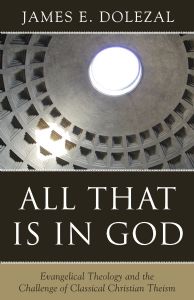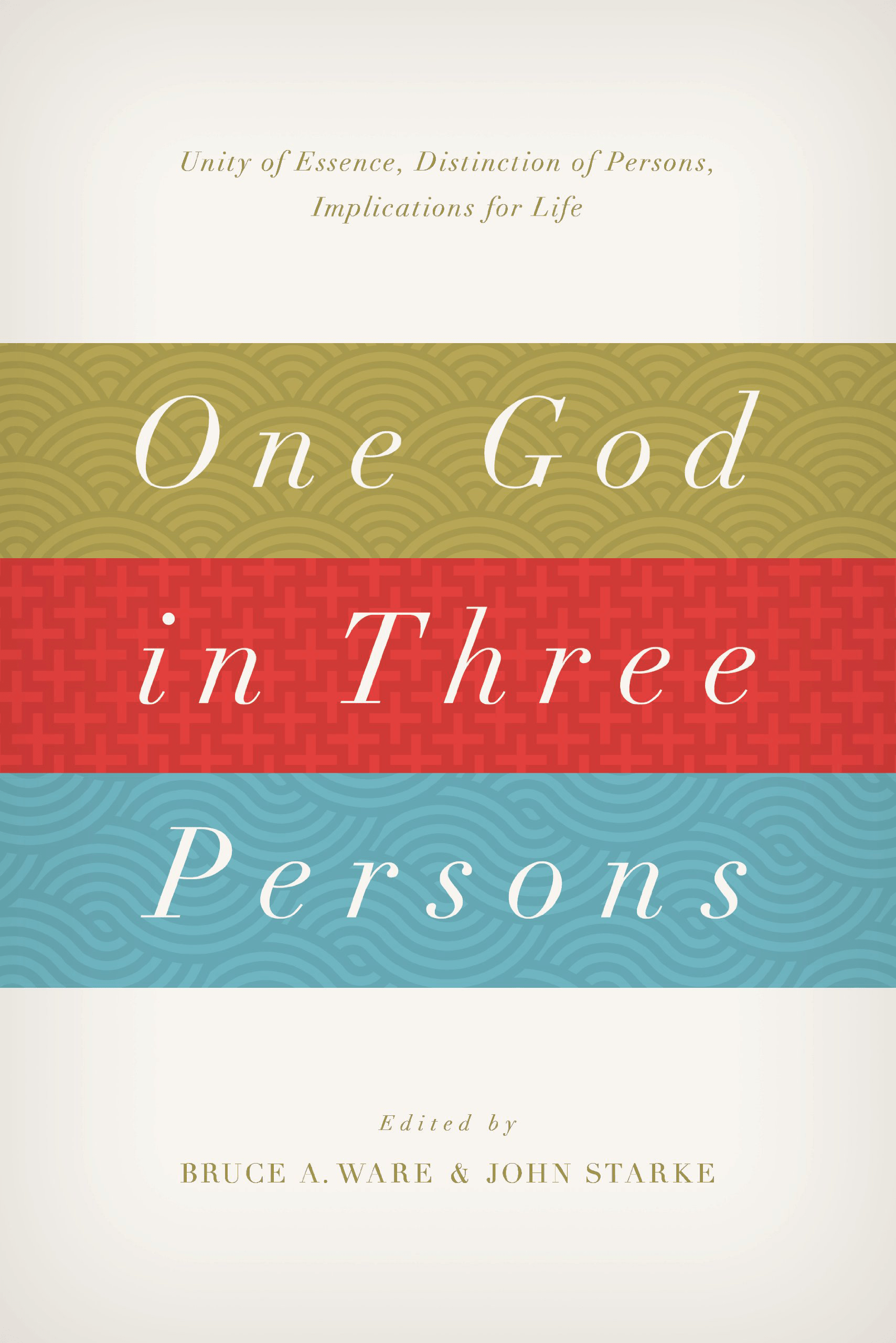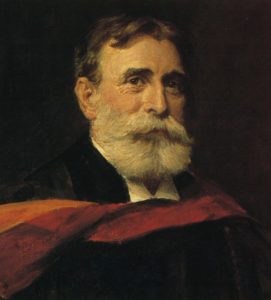Dolezal, James E. All that Is in God: Evangelical Theology and the Challenge of Classical Christian Theism. Grand Rapids: Reformation Heritage, 2017.
Key Issues and Persons
Dolezal identifies his purpose at the outset: “The chief problem I address in this work is the abandonment of God’s simplicity and of the infinite pure actuality of His being” (loc. 117). Later he says, “The underlying and inviolable conviction is that God does not derive any aspect of His being from outside Himself and is not in any way caused to be” (loc. 182). In contrast to his own view are those he labels “theistic mutualists.” Of them he says, “This ontological openness to being changed by creatures, whether initiated by God or by creatures themselves, is the common denominator of all forms of theistic mutualism. Theistic mutualists may disagree among themselves on precisely how much process and development to allow in God or even over what the ultimate source or cause of such development might be. But all hold to a divine ontology that allows for God to acquire and shed actuality of being” (loc 216).*
Dolezal’s list of theistic mutualists is a who’s who of evangelical scholars: J. Oliver Buswell, D. A. Carson, William Lane Craig, R. L. Dabney, John Feinberg, John Frame, Charles Hodge, Ronald Nash, Donald Macleod, J. P, Moreland, K. Scott Oliphint, J. I. Packer, Alvin Plantinga, Robert Reymond, Kevin Vanhoozer, Bruce Ware, Nicholas Wolterstorff. But Dolezal holds that on his side are Thomas Aquinas, Francis Turretin, John Owen, Herman Bavinck, and the Reformed confessions.
For Dolezal the stakes of this debate are high. He quotes favorably Eastern Orthodox theologian David Bentley Hart that any god other than that of classical theism “can never be more than an idol: a god, but not God; a theos, but not to Theos; a being, not Being in its transcendent fullness.” Dolezal himself goes on to say, “The reason for these strong objections to mutualist understandings of God is that such a God is inevitably mutable and finite and as such is unworthy of worship” (loc. 256). Though Dolezal at times softens his rhetoric, indicating that he thinks that some of the men above know not what they teach, the charge is still serious. It amounts to a charge of heresy, and for the Reformed men, at least, an abandonment of their confessions.
Theological Methodology: Scripture and Confessions
At the root of the division that Dolezal outlines is a methodological debate within evangelicalism between exegetically-focused theologians and historically-focused theologians. On the one side are the exegetically-oriented theologians who wish to tie their theological conclusions tightly with exegesis. On the other side are the historically-oriented theologians who make much of how the creeds and confessions were understood in the past.
An exegetically-focused theology that is historically uninformed can end up in serious error. The theologian may not recognize that his formulations have already been tried and found wanting because they carry theological implications not consistent with the rest of Scripture. If an exegetically-oriented theologian is departing from confessional tradition, he should do so hesitantly and having interacted carefully with the opposing arguments. On the other hand, it is not sufficient for the historically-oriented theologian to reject new formulations from an exegetically-oriented theologian simply because great theologians of the past, or even church confessions, take a different position. The historically-oriented theologians must demonstrate the exegetical feasibility of their position.
Herman Bavinck outlines a proper theological methodology in volume one of his Reformed Dogmatics. He observes, “A good dogmatic method…needs to take account of all three factors, Scripture, church, and Christian consciousness (1:84). But these three factors are not equal. Bavinck grants, “In every branch of learning, the practitioner begins by living from the tradition. He always gains his first acquaintance of the field from an authority…. It is no different for the dogmatician.” Though this is true “pedagogically,” Bavinck concludes, “Scripture is the sole foundation (principium unicum) of church and theology. In the case of conflict between them, the possibility of which can never be denied on a Reformational view, church and confession must yield to Scripture. Not the church but Scripture is self-authenticating (αὐτοπιστος), the judge of controversies (iudex controversiarum), and its own interpreter (sui ipsius interpres). Nothing may be put on a level with Scripture. Chruch, confession, tradition—all must be ordered and adjusted by it and submit themselves to it…. The confession deserves credence only because and insofar as it agrees with Scripture and, as the fallible work of human hands, remains open to revision and examination by the standard of Scripture” (1:86). As the remainder of Bavinck’s Dogmatics reveals, Bavinck is by no means dismissive of historical theology or the creeds and confessions. But he also attempts to ground his theological exegetically. He begins with exegetical work, moves to history and philosophy, and concludes with his theological formulation.
Though Dolezal claims to be defending the Reformed confessions his methodology is not aligned with the Reformed methodology outlined by Bavinck. A comparison between Dolezal’s treatment of immutability and Bavinck’s demonstrates this. Commendably, Dolezal does begin his discussion of immutability with a discussion of Scripture. However, it is not clear that the Scripture passages he cites actually prove what he seeks to prove. For instance, does Malachi 3:6 really prove that God is pure actuality: “For I the LORD do not change; therefore you, O children of Jacob, are not consumed”? In addition, Dolezal does not deal with the passages that seem to indicate that God does change. Instead, he notes that that Bible speaks of God’s body parts, or his moving through space, and of his changing his mind. He notes that these are anthropomorphic passages and asserts that “when the Bible speaks of God as experiencing changes of relation, affection, or agency” these texts should be understood in the same way. There is no exegetical engagement with why some understand a reference to God’s nostrils as anthropomorphic but cannot understand a reference to God’s anger as anthropopathic (Psalm 17:7-8).
Bavinck, on the other hand, observes the variety of passages that would seem to count against immutability as well as the different ways in which the Bible teaches that God does not change (e.g., with regard to “existence and being” but also with regard to “thought and will” and “plans and decisions”). When Bavinck, after surveying the history of the doctrine and its philosophical implications, formulates the doctrine, he takes all of the biblical data into account. He affirms that God is immutable in “essence,” “knowledge,” and “will.” He also holds that scriptural language about God changing is anthropomorphic. But he also observes, “This immutability, however, should not be confused with monotonous sameness or rigid immobility. Scripture itself leads us in describing God in the most manifold relations to all his creatures. While immutable in himself, he nevertheless, as it were, lives the life of his creatures and participates in all their changing states.” Nonetheless, Scripture, Bavinck avers, “prohibits us from positing any change in God himself” (2:153-59).
Because Bavinck dealt with the full range of Scripture, I found his account of immutability more satisfying than Dolezal’s even though they allegedly hold to the same position. In Dolezal there was a great deal of emphasis on the implications of God being pure actuality without Bavinck’s qualification that this cannot mean that God exists in a “rigid immobility” that prevents his “manifold relations to all his creatures.”
Theological Methodology: The Role of Philosophy
Dolezal’s largely philosophical approach is not a minor aspect of his methodology. In his discussion of simplicity Dolezal says,
The medieval scholastic theologians, as well as the seventeenth-century Protestant scholastics who followed them, had articulated the doctrine of simplicity in terms of an elaborate scheme of denials in which the four causes known through Aristotelian metaphysics (final, formal, efficient, and material) were carefully denied of God. But one would need to presuppose the basic accuracy of Aristotelian metaphysics (or at least that version of it as modified by Aquinas and others) for such elaborate denials to continue to make sense. After Hume and Kant’s attack on the perennial Aristotelian philosophy, many a Christian theologian opted to abandon, rather than defend, the metaphysical structure (regarding being, becoming, and causation) in terms of which simplicity had been so meticulously developed. Indeed, many Christian theologians and ministers retreated from the field of metaphysics altogether and retrenched themselves in their Bibles, assuming that the Bible’s teaching could be successfully preserved without committing oneself to a particular understanding of being. [loc 1390-98]
This may be one of the most important methodological statements in Dolezal’s book. It states that Dolezal believes that Aristotelian metaphysics are essential to formulating an orthodox doctrine of God.** This is a massive claim, and it would commit Dolezal, one would think, to demonstrating that the Scripture itself requires, or at least implies, an Aristotelian metaphysic. Failing this, I think Dolezal’s insistence on an Aristotelian metaphysic violates the Reformation principle of the sufficiency of Scripture.
Timothy Ward observes the doctrine of Scripture’s sufficiency has two aspects: “‘Material sufficiency’ asserts that Scripture contains everything necessary to be known and responded to for salvation and faithful discipleship…. ‘Formal sufficiency’ claims that Scripture as the word of God ought not ultimately to be subject to any external authority of the church or a Spirit-filled individual, and so is significantly ‘self-interpreting'” (“Scripture, Sufficiency of,” DTIB, 730). Though Ward does not mention the external authority of a philosophical system, such an authority would contradict the formal sufficiency of Scripture.
Leinsle, in his Introduction to Scholastic Theology, observes that this was precisely the issue that faced the medieval church with the recovery of Aristotle: “The old formula that philosophy is the ancilla [handmaid] of theology presupposed a philosophy restricted to instrumental disciplines. Could this formula still be applied to an independent, comprehensive pagan interpretation of the world, as found in Aristotle’s works, or did scholars have to redefine the relationship [between theology and philosophy” (134, brackets supplied by the translator). Whether Thomas managed to keep philosophy in its ancillary position or not remains a debate until the present day. However that historical debate is solved, Dolezal’s insistence that theologians must accept an Aristotelian metaphysic makes Aristotle no longer an ancilla but a lord over theology, violating the sufficiency of Scripture. Once again in defending what he understands to be the classic Reformed doctrine of God, it seems that Dolezal has departed from the theological method of the Reformation and Post-Reformation.
A practical problem that flows from this problematic methodology is Dolezal’s tendency to come to conclusions on the basis of what logically must be despite Scripture statements to the contrary. For instance, noting agreement that God does not possess nostrils (having no body) or move through space (being omnipresent), Dolezal argues that references to God’s anger or mercy should be understood as anthropopathisms: “God alters the revelation of Himself without altering Himself ontologically. He unchangingly wills change in His ad extra dealings with creatures without willing or experiencing a corresponding change of agency in His own intrinsic actuality. The proper locus of all change is in the revelation of God … and in the effects of His sovereign administration.”*** But does this mean, as some have said, that a Christian is not someone who was formerly under God’s wrath but is now under God’s grace, being, instead, someone who moved to a knowledge of always being under God’s grace? Or is Dolezal saying that when the Scripture speaks of God’s anger that it is not speaking of any affections in God but only of his ad extra acts of punishment? If so, logic seems to be running roughshod over revelation. I would want to affirm immutability and to affirm the move from wrath to grace. And while recognizing that God is impassible, I would not want to deny the affections of love, anger, jealousy, compassion, etc. to God. While recognizing that our language with reference to God is analogical rather than univocal, I want to guard against taking the Scripture’s language about God to be equivocal. This, I think, Dolezal was sometimes in danger of doing. It cannot be that Scripture gives us inadequate and misleading ways of speaking about God that can only be fixed when translated into a philosophical mode of speaking. This is not to deny the theology the role of synthesizing revelation about God; it is to insist that God’s revelation of himself take priority over our deductions of what must be.
A final problem to note with this philosophically-oriented approach is Dolezal’s failure to address problems that his position might logically lead to. For instance, when he claims that relative attributes in God are not ontologically relative, does he make creation necessary? If not, why not? If he is going to critique those who wish to affirm classical theism but who also wish to account for Scripture statements regarding God’s affections or other relations that he has with people for their logical consequences, does he not also have to deal with logical consequences as well? And if the answer at some point is that these things are mysterious (as indeed they are!) why does he draw the line of mystery where he does?
Theological Methodology: Categorizing Classical Theists and Theistic Mutalists
A final methodological problem has to do with Dolezal’s classification of people into the two categories of classical theist and theistic mutualist. There are great differences between those Dolezal groups in the theistic mutualist category. For instance, William Lane Craig does not hold to God’s timelessness and, according to Dolezal, holds to “a form of social trinitarianism.” This puts him at some distance from, say, J. I. Packer. Dolezal, in his discussions of individuals, is clear about these differences. However, in his evaluations they are all lumped back together as theistic mutualists.
On the other hand, there are significant differences among classical theists that are not raised. As noted above, some classical theists seem to argue that a Christian has not moved from wrath to grace but that he has moved to a knowledge that he is under God’s grace. Other classical theists seem to argue that there is a move from wrath to grace, but that that move happens in us rather than in God. Our position as sinner placed us in a wrath relationship to God and at salvation we moved into a grace relationship with God. God didn’t change; our relationship to God changed. I would find the latter position acceptable but the former completely unacceptable, that is unbiblical.
Conclusion
I would not recommend this book as the way forward in the debates about theology proper. Its incendiary charge of idolatry and its problematic methodology renders it an unfit guide. More particularly, Dolezal’s philosophical/speculative approach tends towards saying that what God has revealed cannot really be so because it conflicts with certain philosophical deductions.
My theological method gives weight, though not an authoritative weight, to historical theology and confessions. So I am open to the idea that theology from Hodge to Vanhoozer has taken a wrong turn in theology proper. But that wrong turn and the alternative need to be demonstrated and established on the basis of sound exegesis. Elements of theology proper that are deduced from good and necessary consequence must be good and necessary consequences that flow from rightly exegeted Scripture. As a way forward I would recommend reading the primary sources: Aquinas, Turretin, Owen, Bavinck, Hodge, Oliphint, Horton, Vanhoozer, and Frame. Evaluate their positions according to a methodology that gives due weight to tradition as an ancilla to theology but which retains Scripture as the foundation for theology.
Endnotes
*Not all whom Dolezal places in the category of theistic mutualist would agree with this description of their position. Dolezal, however, maintains that these theistic mutualists misunderstand their own position because they misunderstand the nature of being: “Part of the reason many evangelical theistic mutualists do not recognize that they have already adopted a form of ontological becoming in God is because they have lost sight of what ‘being’ means. They mistakenly assume that ‘being’ indicates merely ‘nature’ or ‘essence.’ Rather it denotes any actuality or ‘is-ness’ whatsoever, that is, any participation in the act of existing (in esse, or ‘to be’)” (loc. 272).
**Dolezal’s insistence that the Bible must be understood through the lens of an Aristotelian metaphysic helps explain the previous endnote. Dolezal describes those he identifies as theistic mutualists in terms that not all would accept on the grounds that they don’t understand “what ‘being’ means.” What he means by this is: they don’t accept an Aristotelian view of being.
***It is worth noting that there is some incongruence in arguing for anthropopathism on the grounds that everybody acknowledges anthropomorphism. In the first place, many of the anthropomorphisms used of God are idiomatic expressions. For instance, Jeremiah 48:25 says “The horn of Moab is cut off, and his arm is broken, declares the LORD.” Clearly, “arm” is idiomatic for strength or power, and we should expect, when we read God say in Isaiah, “Was my arm too short to deliver you?” (Isa. 50:2) the idiom to also refer to power. So when Numbers 32:10 says that Yhwh “was hot in the nostrils” this is clearly not an statement regarding God’s body; it is an idiom regarding anger. This the translation: “And the Lord’s anger was kindled on that day.” But, having rendered the Hebrew idiom into an English idiom are we now required to argue that God’s anger cannot be kindled because God is immutable and impassible? Can we not affirm immutability, impassibility and that it is proper to ascribe the affection of anger to God?
Edited 3/26/2020



 Warfield, Benjamin B. “The First Question of the Westminster ‘Shorter Catechism.'” In The Works of Benjamin B. Warfield. Volume 6. 1932; Reprinted, Grand Rapids: Baker, 2003.
Warfield, Benjamin B. “The First Question of the Westminster ‘Shorter Catechism.'” In The Works of Benjamin B. Warfield. Volume 6. 1932; Reprinted, Grand Rapids: Baker, 2003.